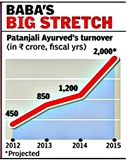Rise of Patanjali Ayurveda – A coincidence or a strategy?

Ayurveda – An Indian based technique to cure diseases and health complications has widely been used all over the world. Ayurvedic medicines and health compliments contain natural and herbal ingredients, thus put no adverse side effect on health whereas other chemicals based artificial health supplements have lots side effects to our body. Many Indian manufacturers like Zandu Pharmaceuticals, Baidyanath, Dabur India Limited, Hamdard etc. have been supplying various ayurvedic and herbal based products in the consumer market for over a century but none of these have got such penetration in Indian consumer market as ‘Patanjali Ayurveda Limited, owned by noted Yoga guru Swami Ramdev, has got. Patanjali Ayurved Limited (PAL), which was founded in 1997 as a small pharmacy has emerged as leader in FMCG (fast moving consumable goods) sector. After surpassing Himalaya Drugs Company and other ayurveda and herbal based manufacturers, Patanjali is set to pose a stiff competition for various FMGC giants like Hindustan Uniliver, P&G and other with already surpassed Emami and Jyothi Laboratories Ltd. Let us discover factors which led Patanjli on this success track.
As mentioned, Patanjli owned by Swami Ramdev who emerged as Yoga guru in late 90s has millions of followers. Millions of his followers trusted in Yoga and Ayurveda to be more effective than modern medical science in curing various health ailments like muscular pain, stomach problems, obesity, mental stress etc. Swami Ramdev organized various Yoga camps in various cities, town in India and abroad. This added more numbers in his followers. Having such numbers of followers was the first reason behind success of Patanjli. Swamiji cashed this advantage and Patanjali products started selling like hot cakes. Initially only ayurvedic medicines were launched by Patanjali. Second reason was easy availability of products in consumer market. Franchise of the Patanjali products was distributed in all major cities and within a span of some time, there was very fast expansion of selling points of the products – Patanjali Arogya Kendra.
The next move of Patanjali was to launch health supplements like chvyanprash and herbal consumable diet like cereals, desi ghee and other edible products in the consumer market. Patanjali offered all products at competitive prices leaving no space for competitors. The products are priced lower than those of other players in the market and influenced the price-sensitive consumer easily. Some Patanjali products ended monopoly of various products like dental cream – dant kanti, shampoo – kesh kanti, skin cream etc.
The latest move of Patanjali is to widen it’s product range in FMCG like soaps, detergents and some edible products. By this Patanjali is expected to make penetration in most selling consumer segment of the country. The Ayurveda company is going to bring about structural changes in the consumer mindset towards packaged products, especially in categories such as infant care and sanitation.
Patanjali got big jumps in franchise numbers and total market revenues after 2010 when there was 67 % total rise in sales and market share. This enthused Baba Ramdev to further expand products ranges and supply channels. Apart from authorized franchises, Patanjali products got available in some retail stores like Reliance retails but with separate kiosk or area in the store to get the products easily eyed by consumers. Unlike all other FMGC companies set huge budget for branding and advertising, Patanjali did not spend much on TV or print media advertising. Rather Patanjali more focused on word of mouth and promotion of products by Baba’s followers who are millions in number. Activists of ‘Bharat Swabhiman’ – a social organization of Baba Ramdev also promote the products.
Patanjali products are also health-driven and have been able to generate more awareness among consumers. How Patanjali could have been behind in E-commerce driven society?, it has facilitated consumers with buying Patanjali products online. Recently, the Defence Research and Development Organization roped in Patanjali Ayurved to manufacture some herbal supplements and food products to market in the country and abroad.
So, Patanjali success is not merely a coincidence but a planned strategy which identified consumer market, launched products, made the easy access of the products, made transformations in the products and added categories in products ranges. If this pace persists, Patanjali is set to become one of top FMCG company in the country.
Also read the similar articles –
Unstoppable Baba. Patanjali now predicts to be top FMCG company by one year.
Rise of Patanjali Ayurveda – not a coincidence but strategy.
Consumer behaviour strategies of Patanjali Ayurveda.

 Currency Convertor
Currency Convertor Post an article
Post an article Elive Today.
Elive Today.
 sending...
sending...




